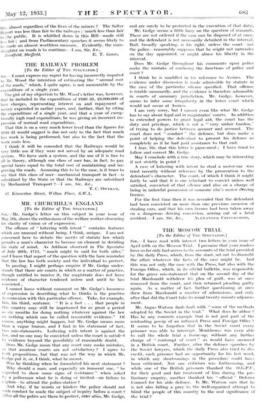MR. CHURCHILL'S ENGLAND - [To the Editor of THE SPECTATOR.]
SIR,—Mr. Gedge's letter on this subject in your issue of May 5th, shows the enthusiasm of the welfare worker obscuring his clarity of vision or of expression.
The offence of "loitering with intent" contains features which are unusual without being, I think, unique.. I am not concerned here to debate the merits of statute law which permits a man's character to become an element in deciding his state of mind. As Addison observed in The Spectator of July 20th, 1711, "much might be said for both sides," and I leave that aspect of the question with the bare reminder that the law has both society and the individual to protect.
In passing, I might perhaps enquire if Mr. Gedge under- stands that there are courts in which as a matter of practice, though entitled to receive it, the magistrate does not have evidence of character tendered unless and until he has convicted .
I cannot leave without comment on Mr. Gedge's looseness of expression in describing what he thinks is the practice in connexion with this particular offence. Take, for example, this, his third, sentence. " It is a fact . . . that people in this country may still be imprisoned for as great a period as six months for doing nothing whatever against the law on nothing which can be called reasonable evidence." Of course, anything might happen, but Mr. Gedge means more than a vague truism, and I find in his statement of fact, two mis-statements. Loitering with intent is against the law, and no one may be convicted unless the court is satisfied by evidence beyond the possibility of reasonable doubt.
Does Mr. Gedge mean that any court may make mistakes, or that amateur courts are not satisfactory ? I agree to loth propositions, but that was not the way in which Mr. (;edge put it, or, I think, what he meant.
Was he thinking when he formulated his next statement ?
Why should a man, and especially an innocent one, "be (xpected to show some signs of resistance" when asked by a policeman what he is doing or invited—on " failure to explain--to attend the police-station ?
And why, if he resists or hinders the police should not such conduct be made the subject of inquiry before a court ? After all the police are there to proteCt, inter alias, Hi. Gedge,
and are surely to be protected in the execution of that duty.
Gedge seenisn little hazy on the question of remands. These are not ordered if the case can be disposed of at once, and the defendant is not necessarily detained in the interval. Bail, broadly speaking, is his right, unless the court- not the police—reasonably supposes that he might not surrender on the day appointed, or might abuse his liberty in the interval.
Does Mr. Gedge throughout his comments upon police make the mistake of confusing the functions of police and court ?
I think he is muddled in his reference to Assizes. The evidence under discussion is made admissible by statute in the case of the particular offence specified. That offence is triable summarily, and the evidence is therefore admissible in courts of summary jurisdiction. Mr. Gedge, however, seems to infer some irregularity in the lower court which would not occur at Assizes.
I am very sorry, but I cannot even like what Mr. Gedge has to say about legal aid in magistrates' courts. In addition to extended powers to grant legal aid, the court has the duty and privilege, which is not a " very unfair burden," of trying to do justice between accuser and accused. The court does not "conduct" the defence, but does make it point of helping the defendant to present his defence as completely as if he had paid assistance to that end.
I fear, Sir, that this letter is piece-meal ; I have tried to follow and correct Mr. Gedge.
May I conclude with a true story, which may be interesting if not strictly in point ? A case of loitering with intent to steal a motor-car was tried recently without reference by the prosecution to the defendant's character. The court, of which I think it might fairly be said that it is one reluctant to convict unless well satisfied, convicted of that offence and also on a charge of being in unlawful possession of someone else's motor &Wing licence.
For the first time then it was revealed that the defendant had been convicted on more than one previous occasion of stealing cars, and that his own licence had been taken away on a dangerous driving conviction, arising out of a fatal
































 Previous page
Previous page